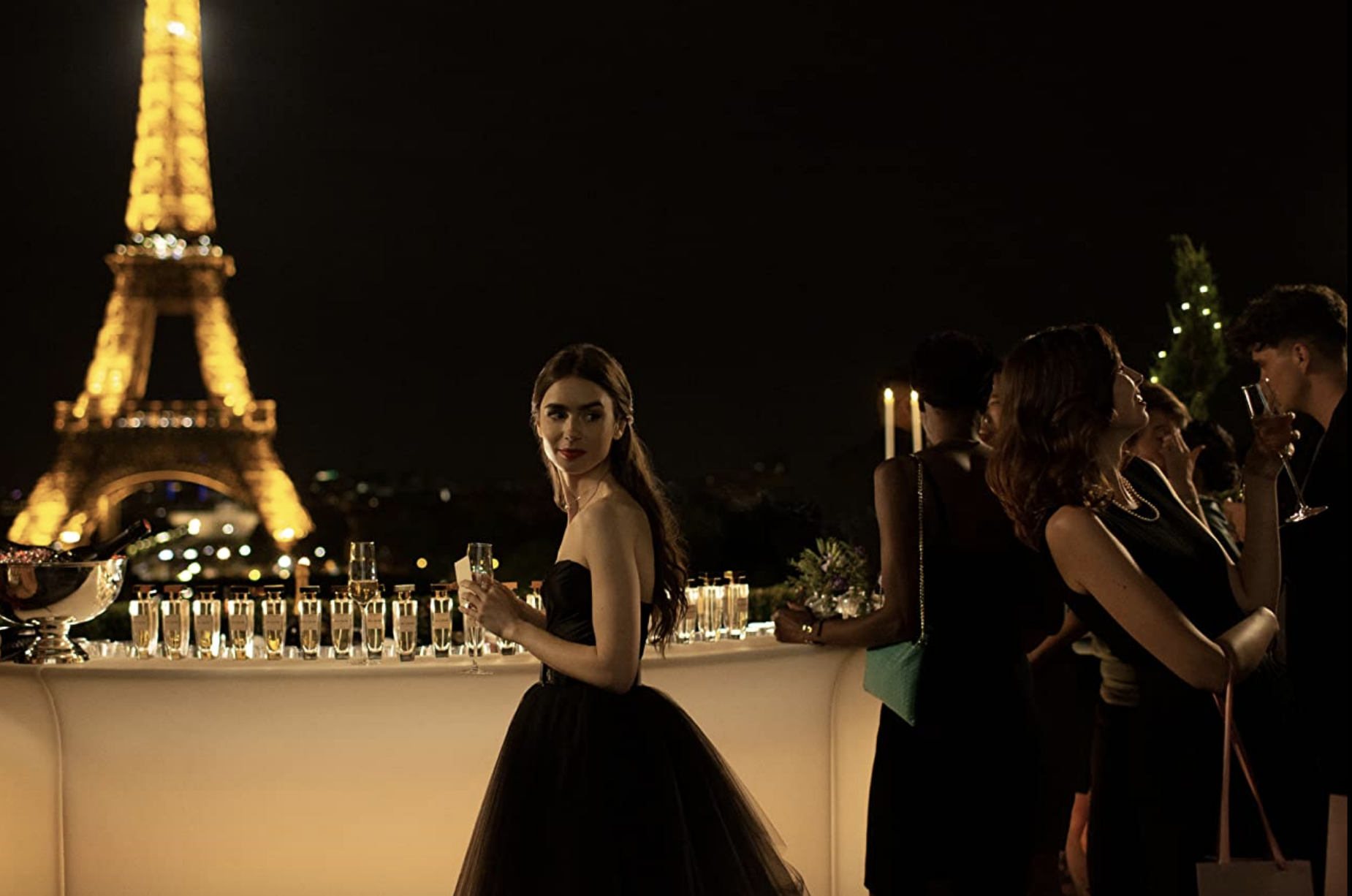Emily in Paris is the new Netflix show that we either love to hate or hate to love. The titular character, Emily Cooper, (Lily Collins) is a Chicago native, marketer, and influencer who embarks on a newfound journey to Paris for work. Despite having no knowledge of the French language or culture, Emily leads a seemingly unrealistic life with a bigger-than-most chambre de bonne and designer pieces she most definitely cannot afford. Personally, these aspects made Emily in Paris the perfect show to binge after my 5 am Zoom classes. After my professors fried, baked, and boiled my brain, Emily in Paris offered twenty or so minutes of glamorous zoning out. I can understand why the show gained so much popularity: it transported viewers from their mundane, quarantined lives to Paris, the city of love.
The lighthearted, feel-good show premiered on October 2nd with high expectations, thanks to having Sex and the City producer Darren Star and The Devil Wears Prada costume designer Patricia Fields on the team. However, many critics were displeased by the 10-episode project. The Guardian rated the show one out of five stars, Huffpost called it, “boring and basic,” and Vogue described the styling in the supposedly fashion-forward project as “the most cringe-worthy trigger.” Social media meme accounts have even dubbed Emily Blunt’s character in The Devil Wears Prada, Emily Charlton, as the only Emily that needs to be in Paris. I can understand the reasoning behind the criticism: Star geared Emily in Paris to appeal to an oblivious American audience. It employed an overly predictable plot and promoted stereotypical and offensive portrayals of Parisians—lazy, short-tempered, unfaithful, sexist, and mean.
My biggest critique of the show is the lack of diversity. Similar to Sex and the City, Star hires an almost all-white cast with only two characters who are people of color: Mindy Chen (Ashley Park) and Julien (Samuel Arnold). Mindy’s entire existence revolves around Emily—throwing her a party, listening to her woes, and taking her out to brunch—and her own life gets put on the backburner. Mindy eventually receives the spotlight with her beautiful “La Vie En Rose” solo, but that doesn’t diminish the fact that she simply fills the role of the Asian Sidekick. Think of Awkwafina in Ocean’s 8, Keiko Agena in Gilmore Girls, Karen Fukuhara in Suicide Squad, and the list, unfortunately, goes on. The industry continues to employ these stereotypes for two reasons: the sidekick guides the main character forward in her (but sometimes his) journey and more importantly protects film and show producers from receiving backlash about the lack of diversity.
Of the two POC characters, Mindy received the long end of the stick: Star doesn’t even bother to give Julien a last name. The only reason Julien exists is to fill the trope of what I call the Black Gay Best Friend, or BGBF for short. While not as ubiquitous as the Asian Sidekick, the BGBF kills two birds with one stone: they fill two diversity quotas in the racial and sexual categories, à la Ncuti Gatwa in Sex Education and Mesach Taylor in Mannequin. As the cherry on top, Julien is fully packaged with eye rolls and sass, further perpetuating the overplayed stereotype of the Gay Best Friend. We can’t expect a single show to change problems long rooted in Hollywood history, but Star could have easily given Mindy and Julien real storylines and character development.
Another common point of criticism is Emily’s dismissal of learning French or anything about the French culture. Both characters in the show and critics alike denounced Emily’s language barrier, characterizing it as pretentious and lazy for expecting everyone else to speak perfect English. Emily’s boss Sylvie Grateau (Philippine Leroy-Beaulieu), the reimagined Miranda Priestly from DWP, monologues, “Look. You come to Paris. You walk into my office. You don’t even bother to learn the language.” However, it’s not like Emily is not trying. My empathy for the truly unlikeable character derives from my own experience immigrating to the U.S. in first grade. Learning a brand new language in a foreign environment is a formidable challenge, further exacerbated by natives who scorn the newcomer. Viewers should cut her some slack. Emily never fathomed living in Paris before, so of course, she doesn’t know the language. If you were suddenly relocated to a new country, wouldn’t you struggle as well?
Quite frankly, if Emily in Paris premiered this time last year, I wouldn’t have made it past the pilot. Swarmed with college apps and senior year responsibilities, I couldn’t have stood watching Emily always babbling about “bringing the American perspective” and POC characters playing stereotypical roles that should be outdated by now. However, it’s 2020, and there’s a pandemic. For twenty-something minutes a day, I enjoy escaping into the glamorous, low-consequence Parisian world of Emily Cooper—and her ridiculously attractive lovers.





